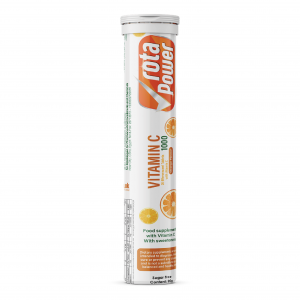
Sources of Vitamin C include many fruit and vegetables such as; oranges, grapefruit, kiwi, strawberries, red peppers, broccoli and tomatoes.10 As Vitamin C can be destroyed by heat from cooking methods, raw foods contain higher amounts of vitamin C.9
Vitamin C is involved in several physiological processes in the body; it is needed for the synthesis of certain neurotransmitters, L-carnitine and collagen- a vital component of connective tissue found in tendons, ligaments, bones, cartilage, skin and blood vessels9. For this reason, Vitamin C is thought to be important for tissue repair and wound healing; research suggests that impaired wound healing is associated with reduced collagen formation and loss of connective tissue.1
Vitamin C supports growth and maintenance of healthy skin through collagen and elastin formation, it reduces the activity of melanocytes which are responsible for skin pigmentation.2 Evidence also suggests that Vitamin C may lessen signs of skin ageing and wrinkles,3 so is commonly recommended by dermatologists.
As a potent antioxidant Vitamin C neutralizes free radicals that arise during normal cellular processes, environmental pollution and exposure to ultraviolet radiation which can lead to oxidative stress and cell damage. Free radicals have been linked to a variety of conditions; such as arthritis, cardiovascular disease and certain types of cancers.4 In addition to the regeneration of other antioxidants (alpha-tocopherol or Vitamin E), it’s proposed the antioxidant properties of Vitamin C may reduce inflammation and delay the development of these diseases.5
Vitamin C is vital to the normal functioning of the immune system, it stimulates production of white blood cells (lymphocytes) which protect the body against infection; consequently, deficiency can weaken the immune system and cause susceptibility to infections.8 Although Vitamin C may not stop you from catching a cold; some studies have shown that its beneficial at reducing the severity and duration of the common cold.6
Vitamin C deficiency is usually caused by diets lacking enough fresh fruit and vegetables; symptoms of which include tiredness, irritability and weight loss.11 However severe prolonged deficiency, causes a condition called scurvy which can cause bruising, gum and dental problems, dry hair and skin, anemia and infections. Certain factors can increase the body’s requirement for Vitamin C and put them at risk of deficiency such as pregnancy or smoking. The treatment of Vitamin C deficiency involves a diet rich in fruit and vegetables as well as daily Vitamin C supplements. 11
Another important role of Vitamin C is to increase the absorption of non-heme iron which is present in plant-based foods7, so nutritionists may recommend having a glass of orange juice or vitamin C supplement at the same time as iron tablets.
Despite the numerous health benefits of taking Vitamin C it is possible to take too much; the maximum daily intake for adults which is unlikely to cause side effects is 2000 mg daily, above this can cause gastrointestinal disturbances and diarrhea. 12 Research has shown that the absorption of Vitamin C is reduced to less than 50 % with doses above 1000 mg.9,12 Vitamin C is not stored in the body, so when the body’s tissues are saturated the rest is excreted in urine.9
Generally, the best way to get your daily dose of Vitamin C is through a well- balanced diet with plenty of fresh fruits and vegetables. For those wanting take Vitamin C supplements it’s always best to check with a healthcare provider to ensure how much is suitable for you.
References
- Pullar JM, Carr AC, Vissers MCM. The Roles of Vitamin C in Skin Health. Nutrients. 2017;9(8):866. Published 2017 Aug 12. doi:10.3390/nu9080866
- https://www.pharmacytimes.com/view/vitamin-c-for-improved-wound-healing
- Lee C., Yang H., Kim S., Kim M., Kang H., Kim N., An S., Koh J., Jung H. Evaluation of the anti-wrinkle effect of an ascorbic acid-loaded dissolving microneedle patch via a double-blind, placebo-controlled clinical study. J. Cosmet. Sci. 2016; 38:375–381. doi: 10.1111/ics.12299.
- Lobo V, Patil A, Phatak A, Chandra N. Free radicals, antioxidants and functional foods: Impact on human health. Pharmacogn Rev. 2010;4(8):118-126. doi:10.4103/0973-7847.70902
- https://ods.od.nih.gov/factsheets/VitaminC-HealthProfessional/
- Hemila, H.; Chalker, E. Vitamin C for preventing and treating the common cold. Cochrane Database Syst. Rev. 2013, 1, CD000980.
- Gershoff Vitamin C (ascorbic acid): new roles, new requirements? Nutr Rev 1993;51:313-26.
- Carr AC, Maggini S. Vitamin C and Immune Function. Nutrients. 2017 Nov 3;9(11):1211. doi: 10.3390/nu9111211. PMID: 29099763; PMCID: PMC5707683.
- https://www.hsph.harvard.edu/nutritionsource/vitamin-c/
- S. Department of Agriculture, Agricultural Research Service. Food Data Central external link disclaimer, 2019.
- https://www.merckmanuals.com/home/disorders-of-nutrition/vitamins/vitamin-c-deficiency
- Institute of Medicine (US) Panel on Dietary Antioxidants and Related Compounds. Dietary Reference Intakes for Vitamin C, Vitamin E, Selenium, and Carotenoids. Washington (DC): National Academies Press (US); 2000.



